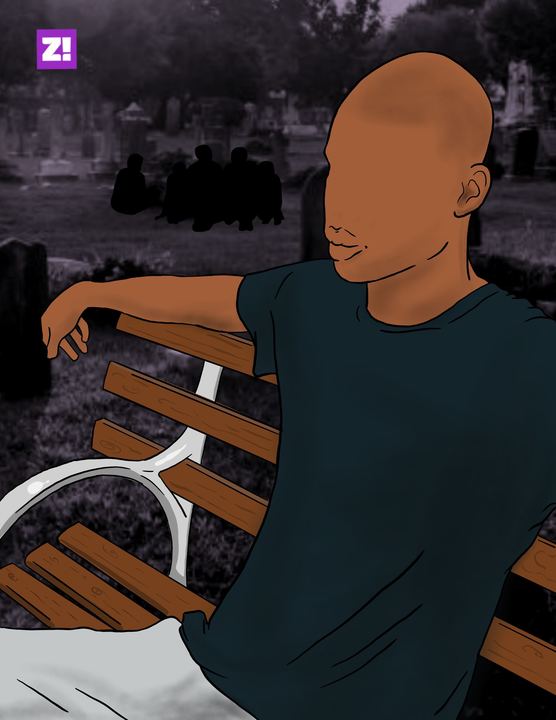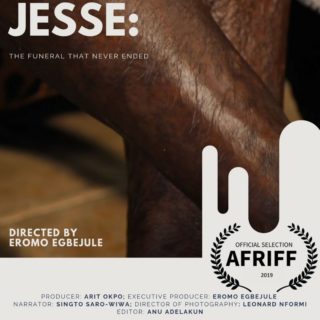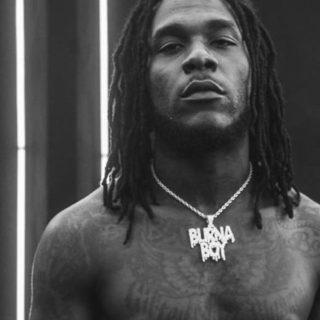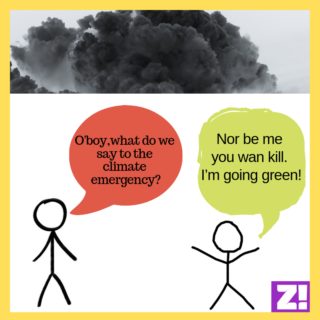
On April 1, 2018, my phone rang. The lit screen read ‘Dad’, but my father had died in February.
“What horrible thing had I done that my dead father was calling me from the grave?”
I answered and steeled myself for what was to come. After the longest three seconds of my life, my sister’s voice came through on the other end. Now, she didn’t call me with my dead father’s phone as an April Fools’ prank; she just didn’t possess enough self-awareness at the time to understand the terrifying nature of what had just happened.
Those three seconds of anticipation were longer than the longest one minute of my life, which was the amount of time that passed between when my sister called (weeks earlier) to tell me my father had been involved in a car accident and when my half-brother eventually told me that my father had died.
I was travelling through Benue in a bus filled with strangers around 9 pm on a Saturday in February when my sister called to frantically give me details about the accident. He’d run his car under a parked trailer while travelling home. He was already dead at the time of this conversation but no one had told her yet.
Attempts to reach my mother on the phone were unsuccessful, so I settled for my half-brother who was failing in his effort to provide a soft landing for me.
“You have to take it like a man, you hear?” he said over the poor connection.
“Guy, just tell me what the fuck is going on,” I replied in frustration, knowing I could soon run into a stretch of road where the connection would get worse.
He confirmed that my 60-year-old father was indeed dead. I hung up almost immediately.
I’m not sure when it happened, but I had developed a nonchalant attitude towards death a long time ago. When I lost a friend to death at 10, it didn’t weigh too heavily on me, even though we were close. At the time, I simply put it as being too confused by the finality of death.
When I was 13, my uncle died. Midway through my loud, rolling-on-the-floor performance, I realised that even though it made me sad, I wasn’t really torn up about it; I was only mirroring what everyone else was doing to not feel left out, especially under the prying eyes of the sympathisers that thronged our compound that evening.
My nonchalance with death continued to grow over the years, but I had never lost anyone so close to me that the feeling would be challenged, until my father.
When I got the news, I was in a bus headed to Taraba to spend a week with people I considered family during my service year in 2015, It was my first vacation in the two years since I left home to work in Lagos. Other than imagining all the terrible ways my father’s death would affect my mother, the most terrifying thing on my mind after hearing about his death was that I might die that night too.
I had spent a great chunk of the trip wondering how my family would take the news if they were told that I died in an accident on my way to Taraba, especially because they had no idea I was making that trip.
So when I received the news of my father’s death, the thought became more chilling and I wondered if my mother could take such a call about me on top of what she already had to deal with.
I quickly found out that my father’s death didn’t do much to challenge my nonchalance towards death; I didn’t feel the sting.
Sure, it made me sad, and I was concerned about all the ways it was going to affect my very large family in the short and long run, but it didn’t shatter my world as you’d expect for someone whose father just met a tragic end. It made me feel guilty of being a terrible son.
I tried my best to cry in the darkness of the bus, but I realised I was forcing it and attempting to openly act grief, so I gave up.
Then I decided to fill the hole growing in me with ensuring the rest of my family was good. For context, my father was quite prolific with women in his days, so he married three wives and had nine kids (that we know of), who lived under the same roof.
I called my sister to be sure she had been informed and sent her money to travel home in the morning. I didn’t have the right words to console her; I suck at the entire grieving thing.
I called my other half-brother and then one of my half-sisters to talk through what had just happened, all the while trying to reach my mother.
I couldn’t get a hold of her until close to midnight, this time from a hotel room in Taraba. She sounded better than I feared she would.
She made things easy for me; the words I had hoped to use to console her, were the words she said to attempt consoling me. Months later, I would find out that she was acting her best on the phone to not bother me about how she was taking it.
I spoke with my sister again before bed and she asked me the one question I had been dreading all night – “When are you coming home?”
To postpone what I believed was going to be a harrowing conversation, especially with someone of my sister’s disposition and considering the situation, I told her it would depend on how burial plans turned out. At this point, I had already lied that I was on a work trip to Benue State, conveniently not mentioning Taraba because that could trigger suspicion that I was on a joyride.
Of my father’s nine children, four of us weren’t living in our hometown anymore, the other three were planning to return the next day. My half-brother, my father’s eldest, was in Kogi State, only a couple of states from Taraba. I could have told him that we could travel back together, but I didn’t want to go home.
Before his death, my father worked in a neighbouring state, so he was absent a lot during my childhood, only ever around on weekends when he would mostly hang out with his friends, brothers, and cousins in town. What he helplessly lacked in physical presence, he made up for in responsible support.
He cared a lot about his children and was especially interested in making sure that we were properly educated and took advantage of privileged opportunities. Sometimes, he was even openly loving.
I remember when I returned home from Taraba some months after my service year and he hugged me and said he missed me. It was a hug I was eager to break away from, but it was one of the best moments we ever shared. He never put it in so many words, but I’m sure he was very proud of me and I loved him for it.
The night of his death, I remembered how, when I was a child, dressed in his shorts and white singlet, he’d sit me down every two weeks and dye my natural dreadlocks black to make sure it never turned brown. It’s a memory that sticks out whenever I think about him.
These memories made me feel guilty that sleep came easily that night in February when I’d just heard of my father’s death. “Am I this coldhearted?” I asked myself.
My sister called the next morning to tell me the burial had been fixed for Thursday, before asking the dreaded question about coming home again.
“I won’t be able to make it,” I said as I prepared myself for what I knew was definitely about to come.
“Is it because of work? Can’t you tell them your father just died? What’s wrong with you?” she asked, trying to make sense of my decision.
It would have been easy to use work as a cover, but I was insistent that it was a personal decision that I wasn’t too interested in explaining to her, mostly because I didn’t fully understand it myself.
She didn’t take my decision too well, and she expressed that in many words, but I’d learned to deal with her over our many years together, so it wasn’t particularly hard to just let her vent. I understood.
I had to call my mother immediately to explain my decision before my sister did, and, again, she calmly accepted it, ever the great actress.
My decision to not go home to pay final respects to my father in death wasn’t one that took a lot of thinking, but it wasn’t one that I took lightly.
I realised that the way I wanted to mourn my father — in silence — was one that would never conform to the circus our home was about to become – a revolving door of sympathisers who would say too little, or say too much; sympathisers who’d tell you to take it like a man because the women were now looking up to you; sympathisers who’d demand that prayers be made to send him off to heaven even though he was hardly ever a religious man; sympathisers who would, despite their good intentions, do nothing to assuage your grief.
I didn’t want to be a part of that circus; I wanted to process in my own way, cut off from the rest.
I was particularly ticked off by my siblings’ behaviour in the initial hours of my father’s death; a few of them posted his pictures on their social media feeds, announcing his death.
While I do realise it’s hypocritical of me to criticise their own grieving process while I wanted to be left alone with mine, I was mostly ticked off because theirs affected mine.
I only told a few friends about my father’s death. A friend who I hadn’t informed saw my siblings’ social media feeds and put up a condolence message, with my name, on his own WhatsApp status before calling me. Another friend I hadn’t spoken to in years saw his message and reached out on Facebook to message me his condolences.
My sister called again at some point to say the family picked out Aso Ebi to wear for the burial ceremony and asked if I wanted mine cut even though I wasn’t attending.
“None for me,” I remember telling her with exhaustion.
In the year that has followed since my father’s death, I haven’t been able to fully convince myself that it was the right or wrong decision to not attend his burial ceremony, but I have learnt to accept that it cannot be undone and that I’m fine with it.
A couple of my friends would ask what kind of relationship I had with the man, perhaps hoping I would say it was bad so they could make sense of my decision, but I loved my father, in the ways that I know to love.
On the day he was buried, miles away from his final resting place, I did my best to shut out the thought that he was being put in the ground and would be gone forever; but, of course, my siblings put up pictures on their social media feeds to make sure I, or anyone else, didn’t miss anything.
The very first time my father’s death really hit me as a real thing was a week later when I had to put down an emergency contact on the bus manifest on my way home. He was always my emergency contact and the realisation that he could never be that any more was haunting.
I eventually made my way home seven days after I first received the news of his death. Seeing his grave for the first time is not a feeling I know how to properly put in words, not even now. It was upsetting that the man I’d known for all of my life was gone in the blink of an eye while doing something he’d done for at least half of his life — driving.
I don’t remember our final phone conversation, not anymore, but the last time I saw my father was in December 2017 when I went home for Christmas. He travelled for work on Boxing Day and I was out with the rest of the family to see him off in the darkness before dawn, a darkness from which he was to disappear from me forever.
I left for Lagos the next day, but he had believed I was going to stay behind until after the approaching New Year. When he returned home to find that I was gone, he called to express his mild disappointment with my absence in another one of our usual 30-second phone conversations (we’re both not men of many words).
Sometime around October after a gruelling workday, I dialled my dead father’s phone number half hoping that he would pick the call. He didn’t, of course, so I left him a voice message that I was well aware he’d never be able to listen to. I told him that I missed him, and that I probably haven’t mourned him as deeply as I should have, but that I loved him regardless. It was unusually longer than 30 seconds this time.
I have never shed a tear over my father’s death, and I’m not sure it’s a thing that I’ll ever do; but sometimes, I wonder if I’m just keeping all the grief stored away in some hole inside and that I might just explode someday when it’s full to the brim.
Is that something I would like to happen to rid myself of latent guilt? I’m not sure, but if such a day does come, I hope it doesn’t kill me.




